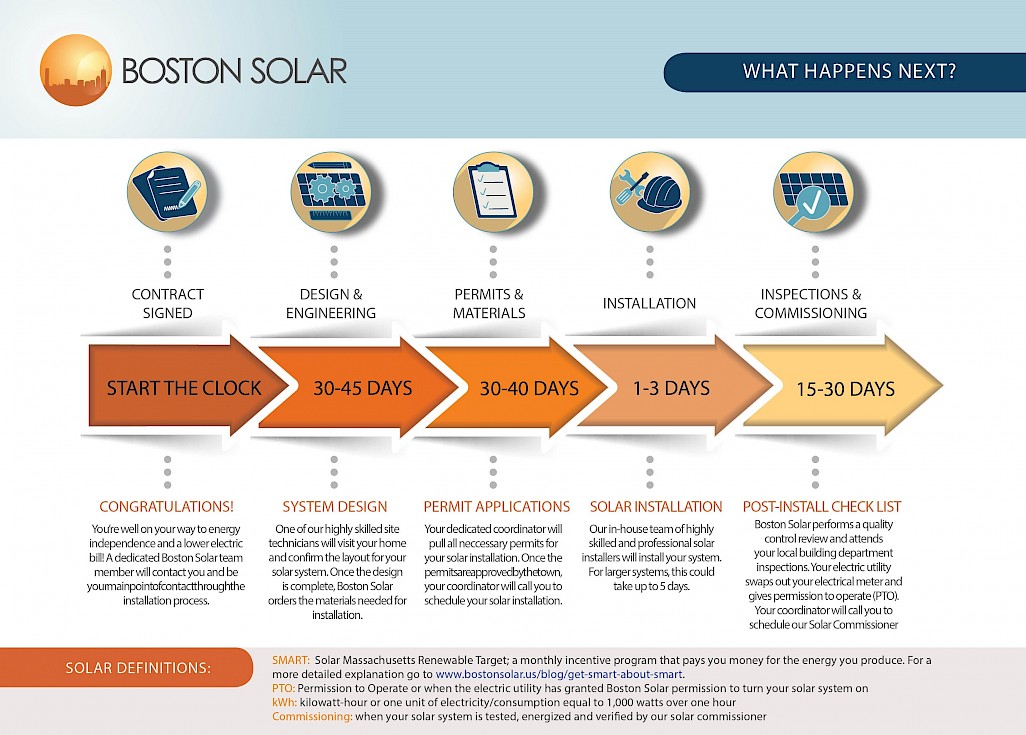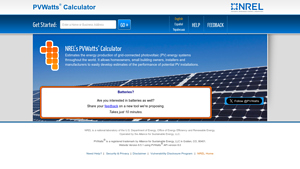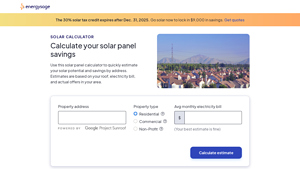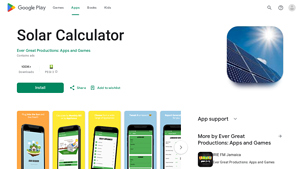Free Solar Calculators: Our Top 5 Picks for 2025
Finding the Best Solar Calculator: An Introduction
Finding the right solar calculator can be a daunting task for homeowners and businesses alike. With a plethora of tools available online, users often struggle to determine which calculators provide the most accurate and actionable insights for their specific needs. The challenge lies not only in the variety of features offered but also in the reliability of the data each tool uses to generate its estimates. As the solar industry continues to grow, having access to reliable resources becomes increasingly important for those looking to invest in solar energy solutions.
This article aims to simplify the process by reviewing and ranking the top solar calculators currently available online. Our goal is to save you time and effort by providing a comprehensive overview of the best tools that can help you understand your solar potential and savings. We will highlight the strengths and weaknesses of each calculator, making it easier for you to choose the right one based on your unique requirements.
Criteria for Ranking
In our evaluation, we considered several key factors to ensure that each recommended tool meets a high standard of quality. Accuracy is paramount; we assessed how well each calculator estimates solar energy production based on user input. Ease of use is another critical aspect; we aimed to identify tools that are user-friendly and accessible to individuals without technical expertise. Additionally, we looked at features such as customization options, the ability to provide detailed reports, and integration with local solar providers. By focusing on these criteria, we hope to guide you towards a solar calculator that best fits your needs and helps you make informed decisions about your solar investments.
Our Criteria: How We Selected the Top Tools
Criteria for Selecting the Best Solar Calculators
When evaluating the top solar calculators available online, we focused on several essential criteria that ensure users can make informed decisions regarding their solar energy options. Here’s how we determined which tools made the list:
-
Accuracy and Reliability
– The primary function of a solar calculator is to provide precise estimates of solar energy production and potential savings. We assessed tools based on their use of reliable data sources, such as local weather patterns and historical solar irradiance data. Calculators that integrate factors like roof orientation, shading, and local electricity rates were prioritized for their ability to deliver more accurate predictions. -
Ease of Use
– User-friendliness is critical, especially for individuals new to solar energy. We examined how intuitive each calculator’s interface is, ensuring that users can easily input their information without confusion. Tools that feature clear instructions, straightforward navigation, and a clean design scored higher in this category. -
Key Features
– Effective solar calculators should include various inputs that allow users to customize their estimates. We looked for calculators that:- Require basic information such as property address and type (residential, commercial, or non-profit).
- Allow users to input their average monthly electricity bill.
- Enable adjustments for roof size, orientation, and shading from surrounding structures.
- Offer options for different solar panel configurations and energy needs, such as electric vehicle charging requirements.
-
Cost (Free vs. Paid)
– The availability of the calculator at no cost was a significant factor in our selection process. We considered whether the tools offered free estimates or if they required payment for more detailed analyses. Tools that provide free access to basic features while offering optional paid services for advanced insights were favored. -
Additional Resources and Support
– We evaluated whether the calculators provided supplementary resources, such as educational content about solar energy, financial incentives, and installation options. Tools that connect users to local installers or provide quotes from pre-screened providers added significant value. -
User Feedback and Reviews
– Finally, we considered user reviews and feedback to gauge overall satisfaction and effectiveness. Tools with positive ratings and testimonials indicating successful outcomes in real-world scenarios were prioritized, as they reflect the calculator’s reliability and user experience.
By applying these criteria, we ensured that our top picks for solar calculators deliver a comprehensive, accurate, and user-friendly experience, empowering users to make informed decisions about their solar energy investments.
The Best Solar Calculators of 2025
1. Solar Calculator Without Submitting to Solar Companies
The Solar Calculator discussed in the Reddit thread is designed for users seeking a flexible tool to estimate residential solar energy needs without the obligation of submitting personal information to solar companies. It allows users to input various variables, enabling them to experiment with different scenarios and obtain tailored solar estimates. This independence from commercial ties makes it an appealing option for those wanting to explore solar energy options freely.
- Website: reddit.com
- Established: Approx. 20 years (domain registered in 2005)
2. PVWatts Calculator
The PVWatts Calculator, developed by the National Renewable Energy Laboratory (NREL), is a powerful online tool designed to estimate the energy production of grid-connected photovoltaic (PV) systems globally. By inputting location and system specifications, users can obtain reliable projections of solar energy generation, making it an invaluable resource for homeowners, solar developers, and researchers looking to assess the viability and efficiency of solar installations.
- Website: pvwatts.nrel.gov
- Established: Approx. 28 years (domain registered in 1997)
4. Solar Calculator: Estimate 2025 Solar Savings
The Solar Calculator from EnergySage is a user-friendly tool designed to help homeowners estimate their solar energy potential and savings for the year 2025. By simply entering their property address, users can quickly access tailored insights into how much they could save by switching to solar panels. This calculator empowers users with valuable information, making it easier to make informed decisions about solar investments.
- Website: energysage.com
- Established: Approx. 20 years (domain registered in 2005)
5. Solar Calculator
The Solar Calculator app, available on Google Play, aims to help users estimate their daily and weekly energy consumption in wattages. With a user rating of 2.3 based on 484 reviews, this free Android tool provides essential insights for those looking to optimize their solar energy usage. However, potential users should consider the mixed feedback before downloading, as performance and reliability may vary.
- Website: play.google.com
- Established: Approx. 28 years (domain registered in 1997)
How to Get the Most Accurate Results
Double-Check Your Inputs
To ensure you receive the most accurate results from any solar calculator, it is crucial to double-check the information you input. Common parameters include your property address, roof size, orientation, and average monthly electricity bill. Make sure the address is correct, as it directly affects the solar potential calculations based on geographic location and local weather patterns. When inputting your electricity bill, try to provide the most recent and accurate figure, as even slight variations can lead to significant discrepancies in estimated savings.
Understand the Underlying Assumptions
Every solar calculator operates based on specific assumptions about solar energy production, costs, and savings. Familiarize yourself with these assumptions to better interpret your results. For instance, some calculators may assume optimal sunlight exposure without accounting for shading from trees or buildings, while others might not factor in local electricity rates or available incentives. Read through the tool’s guidelines or FAQs to understand what variables are included in the calculations and how they may impact your results.
Use Multiple Tools for Comparison
Relying on a single solar calculator may not provide a comprehensive view of your solar potential. Different tools utilize varied algorithms and datasets, which can lead to discrepancies in estimates. For instance, Google Project Sunroof uses satellite imagery to analyze your roof’s sunlight exposure, while other calculators may focus solely on your electricity usage patterns. By using multiple calculators, you can compare results and gain a more rounded understanding of your solar energy potential. This approach also helps you identify any outliers or errors in a specific tool.
Consider the Local Context
Solar energy production can vary significantly based on local factors such as weather patterns, shading from nearby structures, and regional electricity rates. When using an online calculator, pay attention to how it accounts for these local conditions. Some calculators incorporate real-time data from local weather stations, while others may provide generalized estimates. If possible, seek out calculators that offer localized insights, as this can lead to more accurate projections of your potential solar savings.
Keep Up with Incentives and Policies
Solar incentives and policies can change frequently, impacting the financial viability of your solar investment. Before using a calculator, check the current federal, state, and local incentives available for solar installations. Many calculators will prompt you to enter this information, but it’s beneficial to be aware of the latest offerings to ensure your estimates reflect any potential savings or tax credits.
Consult with Professionals
While online calculators can provide valuable insights, they are not a substitute for professional advice. If you are seriously considering a solar installation, consulting with a local solar expert can help you refine your estimates and provide tailored recommendations based on your specific situation. They can also assess your property in person, considering factors that online tools may overlook.
Frequently Asked Questions (FAQs)
1. What is a solar calculator and how does it work?
A solar calculator is an online tool designed to estimate the potential savings and energy production of solar panels for a specific property. By inputting details such as your address, roof characteristics, and electricity usage, the calculator analyzes this data to provide an estimate of how much energy you could generate from solar panels and the associated savings on your electricity bills. Most calculators utilize satellite imagery and solar irradiance data to make these estimations.
2. Do I need to provide personal information to use a solar calculator?
Most solar calculators require minimal personal information to generate estimates. Typically, you may need to provide your address and average monthly electricity bill. Some tools might ask for additional details about your property type (residential, commercial, etc.) or specific roof characteristics, but they generally prioritize user privacy and data security.
3. Are the results from solar calculators accurate?
While solar calculators can provide a good estimate of potential savings and energy production, their accuracy can vary based on the tool used and the data provided. Factors such as local weather patterns, shading from trees or buildings, and specific panel characteristics may not be fully accounted for. For the most accurate assessment, it’s advisable to consult with a professional solar installer who can perform a detailed analysis of your property.
4. Can solar calculators help me find solar installers?
Many solar calculators, particularly those associated with solar companies or platforms, offer the option to connect users with pre-screened solar installers in their area. After calculating your potential savings and energy production, these tools often provide quotes or recommendations for local installers who can help you implement a solar solution tailored to your needs.
5. Is there a cost associated with using a solar calculator?
Most online solar calculators are free to use. They are designed to help potential solar users assess their options without any financial commitment. However, if you choose to pursue solar installation or additional services recommended by the calculator, those may involve costs associated with purchasing solar panels, installation, and maintenance. Always review any terms of service or privacy policies associated with the tools you use.
Important Disclaimer
⚠️ Important Disclaimer
The information and reviews in this guide are for educational purposes only and are based on publicly available information. We are not affiliated with any of the tools mentioned. Features and pricing may change. Always conduct your own research before choosing a tool for your needs.









